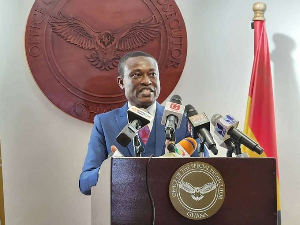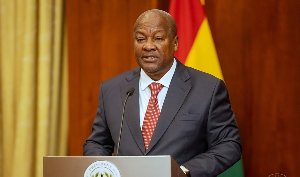Government is proposing a more comprehensive environmental tax regime to help address the issues of climate change, sanitation and solid-waste management in the country.
Currently, there is a 15 percent environmental tax on plastics -- with exemptions for pharmaceuticals and plastics used for water sachets as well as in the agricultural sector - but government says the funds generated have been inadequate to help in waste-management.
Presenting the 2013 budget to Parliament last Tuesday, Finance Minister Seth Terkper stated that “one of the major constraints militating against waste collection and disposal is lack of funding”.
Currently, the main sources of funding for environmental sanitation services are from the national budgetary allocation and donor support, while the Municipal and District Assemblies are expected to use significant portions of their locally-generated revenue to handle their waste collection and disposal.
“These sources of funding have been inadequate and, in the case of donor support, unsustainable. Other competing demands in the national budget tend to make funding for environmental sanitation a low priority,” he said.
Statistics from the Local Government and Rural Development Ministry indicate that solid-waste generation has shot up from 7,000 metric tonnes per day in 1996 to 13,800 metric tonnes in 2011. The sanitation problem, it said, is more pronounced in the urban areas mainly due to rural-urban migration.
“The growing concern about climate change in many advanced and developing countries have brought environmental issues to the forefront of the policy agenda in most of the advanced and developing countries -- of which Ghana should not be left out. The argument has always been pointing at the need to introduce a more comprehensive environmental tax system,” Mr. Terkper said.
As a way forward, the Finance Minister disclosed that an “Environmental Fiscal Reform working group has been formed to look at the various fiscal instruments around the world that can be used to raise revenue for addressing environmental problems in Ghana.”
The working group, he said, “will also look at how the funds raised can be appropriately applied to addressing the environmental concerns in the waste-management, transport and mining sectors.” The group will make proposals that will be incorporated into the 2014 budget.
Mr. Terkper also stated that the Finance Ministry and the Ghana Revenue of Authority (GRA) have been tasked to submit proposals for review of the environmental tax regime to help find a lasting solution to the environmental hazards posed by plastic waste generated from water sachets.
He added that the environmental implications associated with overage vehicles have compelled the Ministry and GRA to conduct a comprehensive review of the tax regime on their importation, and will subsequently make a proposal to Parliament in the course of the year.
Previously, an embargo was placed on the importation of cars of a certain age. Later, penalties were preferred to outright bans on importation.
Business News of Monday, 11 March 2013
Source: B&FT












